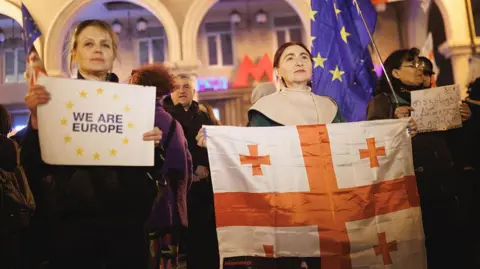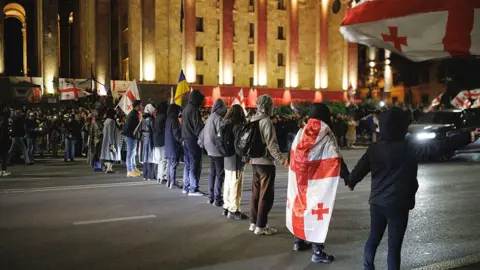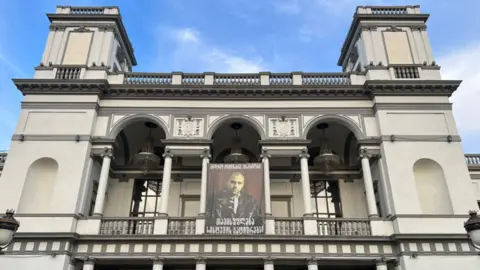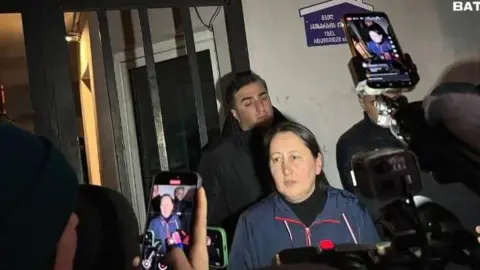Rayhan DemytrieCaucasus correspondent
 NurPhoto via Getty Images
NurPhoto via Getty Images“I’m standing for the future of this country,” says Giorgi Arabuli, who has taken part in protests on the streets of Georgia’s capital Tbilisi almost every night since they began a year ago.
Mass demonstrations were met with violent police crackdowns as tens of thousands of Georgians turned out, angered by Prime Minister Irakli Kobakhidze’s decision on 28 November 2024 to call a four-year halt on moves towards joining the EU.
“I’m from the generation of the 1990s. I’ve seen those dark times after the civil war,” said Giorgi. “Most of it was caused by Russian influence in a post-Soviet country. We don’t want to go back there.”
Since then Georgians have seen a “dismantling of democracy”, in the words of governments across Europe, and it has prompted accusations of Russian-style rule.
On the streets, the protests have evolved into a grinding war of attrition.
For months, Tbilisi’s main Rustaveli Avenue was blocked for a few hours every evening. New laws and a heavy police presence forced the protesters to adapt, marching through adjacent streets and facing nightly arrests.
 NurPhoto via Getty Images
NurPhoto via Getty ImagesThe Georgian Dream government has imposed massive fines for blocking roads, slapped criminal charges on young protesters and most recently pushed through a law allowing up to 14 days’ imprisonment for a first offence of blocking traffic, with repeat offenders facing up to a year in jail.
“Freedom for regime prisoners,” reads a large banner carried towards the nearby Supreme Court.
“They’ve used every method to crush the protests… but the fact is they haven’t been able to,” says Nata Koridze. Her husband, Zura Japaridze, is one of six key opposition figures jailed after refusing to testify before a parliamentary commission into alleged crimes by the previous government.
The six were jailed for up to eight months and banned from holding public office for two years.
Prosecutors have since announced new charges against eight opposition leaders, including Japaridze. They now face up to 15 years for alleged sabotage and aiding foreign powers.
Nata Koridze’s husband is due to be released on 22 December but she says he is due to appear in court again three days later.
They are accused of communicating with Western partners about government abuses – standard democratic practice – as evidence of betraying state interests.
Japaridze, like all the jailed politicians, is held in solitary confinement.
“Zura has not seen anybody except for a doctor and the guard,” she says.
Georgia’s path to EU membership, once the cornerstone of its post-Soviet identity, is now farther away than ever.
Earlier this month, the EU’s annual enlargement report delivered what its ambassador to Georgia called “devastating” findings, concluding it was now considered an EU candidate “in name only”.
“Georgia is not on the trajectory to become an EU member state, neither in 2030 nor later,” said Pawel Herczynski, rejecting the government’s pledge to ensure membership by 2030.
The BBC approached the head of the parliamentary committee on European integration and other Georgian Dream MPs for comment, but no-one was available.
The government’s public response has been increasingly hostile towards its foreign critics.
Parliamentary speaker Shalva Papuashvili has accused the EU of “ideological and political dictates”, telling pro-government TV this month that “today’s Brussels does not want a Georgia that is like us”.
“They want a country standing on one foot,” he complained. “The policies and approaches in Brussels must be changed. For them, the Georgian people and their choice mean nothing, zero.”
Georgian Dream, in power since 2012, won 54% of the vote in last year’s disputed parliamentary elections, which monitors from Europe’s OSCE security mission said were marked by several shortcomings, including intimidation, coercion and pressure on voters, especially public sector employees.
All opposition parties have since boycotted parliament leaving it entirely in government hands. That means increasingly repressive legislation has been passed unopposed.
As well as steep fines for protesters blocking the road, there have been a restrictive broadcasting law and a law on foreign grants requiring all foreign funding for civil society and media to be approved by a government commission.
Hundreds of protesters have been fined and dozens jailed, among them well-known actor Andro Chichinadze, given two years for allegedly organising protests.
His theatre – once the best attended in Tbilisi – has closed in solidarity.

The belief that Georgia’s government is acting in Russia’s interest is widespread among pro-Europeans here.
They point to the ruling party’s billionaire founder, Bidzina Ivanishvili, who made his fortune in Russia in the 1990s; legislation mirroring Russian laws targeting civil society; the government’s refusal to impose sanctions on Moscow over Ukraine and increasingly hostile anti-Western rhetoric.
Georgia’s leaders reject that portrayal, describing their approach towards Russia as “pragmatic” and their primary duty to maintain peace with their northern neighbour.
“Where are the facts?” said Prime Minister Irakli Kobakhidze, denying pro-Russian bias during a recent TV interview. The government, he said, was being “responsible to Georgian society which wants to keep peace in the country”.
 Batumelebi
BatumelebiThat is not the view of one of Georgia’s most respected journalists, Mzia Amaglobeli, imprisoned for two years for slapping a police officer.
“Russia is conquering us without war. An oligarch is ruling our country, depriving us of a European future and legitimising autocratic, dictatorial rule. We need the support of the democratic world,” she told the BBC in a handwritten letter from prison.
Amaglobeli, who will be awarded the European Parliament’s Sakharov Prize for Freedom of Thought next month, says she has lost the sight of one eye and her remaining vision is worsening in solitary confinement: “I have difficulty reading for even 10-15 minutes at a time.”
Georgia’s democratic decline intensified even before last year’s elections, with a June 2024 Russian-style law on foreign influence that targeted civil society and independent media.
Students played a big part in protests at the time and the government has responded with sweeping education reforms planned next February. Georgia’s 19 state universities will be required to concentrate on a single academic discipline under the slogan “one city, one faculty”.
The reforms will tackle perceived problems including excessive concentration of universities in Tbilisi, duplication of programmes and inadequate state funding.
The prime minister argues that funding should be “focused on fulfilling state tasks”. Leading figures at Georgia’s pre-eminent research institution, Ilia State University, say the reform is more about imposing political control and eradicating free space.
“After political parties, media and NGOs, universities must be put under pressure,” says Nina Doborjginidze, rector of Ilia State University. “If students are removed from the capital, they’re removed from the political scene.”
“This is not about education quality, it’s a political project,” adds vice-rector Georgi Gvalia. “This is an abrupt change in Georgia’s foreign policy from being one of the most pro-European countries in the region to the most difficult partners of the West, and change towards more autocratic great powers, like Russia and especially China.”
Back on Rustaveli Avenue, teacher Rusudan Lomidze, who has attended the protests every day, says Georgia’s fate is inextricably linked to Ukraine’s.
“If Ukraine is forced to sign a capitulation agreement, it will be an absolute disaster for us. Our boys are fighting in Ukraine, and they are fighting for both Ukraine and Georgia.”
The crowds are smaller than they were a year ago, but several hundred protesters still gather every night despite the risks.
Reflecting on her years as a diplomat working towards EU and Nato integration, Nata Koridze now believes “all of that has crumbled”.
“But the protest embodies an idea. And ideas live through decades, through centuries.”

